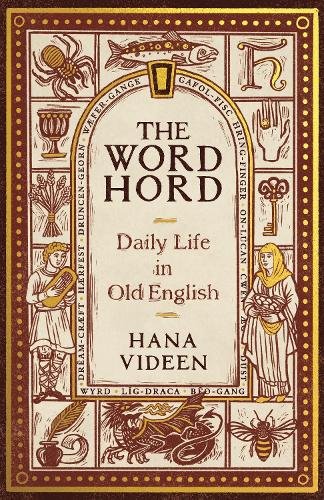
12 Jul Book Review of The Wordhord: Daily Life in Old English
Book Review: The Wordhord: Daily Life in Old English by Hannah Videen
As an old English major (not an "Old English" major, mind you), stumbling upon The Wordhord: Daily Life in Old English by Hannah Videen was like finding a hidden trove tucked away in the dusty corners of a library. The title alone pulls you in, promising a riveting journey through the everyday lexicon and culture of early medieval Britain. I’ll admit: I’ve always had a soft spot for the beautiful cadence of Old English, and this book captured that allure with an irresistible twist of trivia and warmth.
In this delightful exploration, Videen invites readers to stroll through the very fabric of daily life as it was lived and spoken many centuries ago. It’s an encouraging blend of linguistics and history that brings forth themes of community, struggle, and survival. Each section offers a glimpse into the foundational words that shaped the identity of a people. Did you know that the word “garlic” has roots that hint at “spear leek”? Or that remedies like "wolf meat and mandrake root" were once considered effective against what was termed dēofol-sēocnes—essentially, devil sickness? Every page is peppered with linguistic gems that not only educate but also entertain.
Videen’s writing style is both engaging and approachable, a terrific balance that makes this text feel like a warm conversation with a knowledgeable friend. The pacing is thoughtful; instead of overwhelming readers with a deluge of information, each chapter feels like a carefully crafted story allowing you to linger over words like hleahtor-smiþ (laughter-smith) and bān-hūs (bone house), each term rich with historical and cultural significance. It encourages reflection on our own words and phrases, invoking that lovely spark of nostalgia for how language connects human experience across time.
The memorable highlights were the quirky definitions, which felt like little treasures buried within the text. One of my favorites, ‘leornung-cræft’ (learning craft), speaks to my heart as a lifelong learner, while ‘mearc-stapa’ (boundary stepper) resonated with my inner wanderer. Each entry feels like an invitation to weave these words back into our lives—it’s a way of expanding our personal wordhord—our treasure of language.
To anyone who has loved Beowulf or is intrigued by early medieval history, I wholeheartedly recommend placing this book on your nightstand. Commit to reading a bit each week, and allow the words to permeate your thoughts. The Wordhord not only enriches your vocabulary but also deepens your appreciation for the tapestry of life from centuries past.
In conclusion, whether you’re an academic, a word lover, or simply someone looking to connect with the roots of language, this book offers a celebratory glimpse into a world that’s both foreign and familiar. The sensory and playful engagement with Old English in The Wordhord flooded me with nostalgia for my academic roots and left me yearning for more contemplations on the ineffable connections we share through language. It’s truly a joy—pure wynn—and a treasure that will stay with me.
Discover more about The Wordhord: Daily Life in Old English on GoodReads >>









